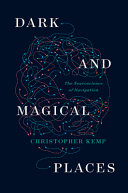2018 School Spending Survey Report
Dark and Magical Places: The Neuroscience of Navigation
COPY ISBN
VERDICT Chock-full of scientific information conveyed by a skilled storyteller, Kemp’s book is recommended for readers interested in the neurological differences between those who have an internal compass and those who get hopelessly lost.
RELATED
ALREADY A SUBSCRIBER? LOG IN
We are currently offering this content for free. Sign up now to activate your personal profile, where you can save articles for future viewing




Comment Policy:
Comment should not be empty !!!